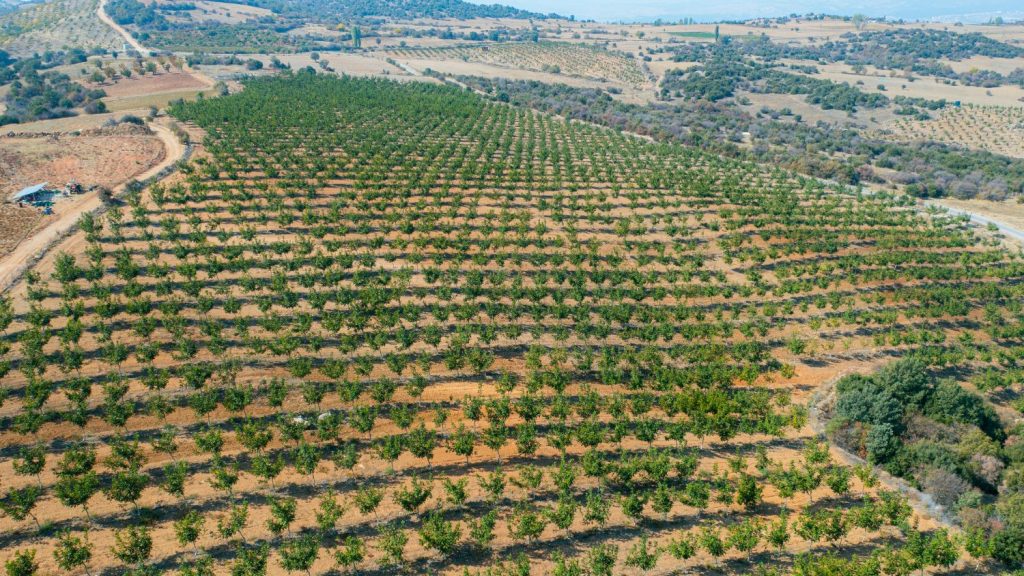Permanent Crops An Investment for the Future
When it comes to agriculture, deciding between permanent crops and row crops is critical for farmers and investors. Each variety of crop has distinct qualities, benefits, and challenges. The appeal of permanent crops to institutional investors also resonates with private investors. This shift is poised to drive a substantial surge in interest in the permanent crop market from institutional and private investors. This article provides an in-depth look at the advantages of investing in permanent crops, the agricultural trends bolstering the growth of perennial crops, and the key distinctions between investing in row crops versus permanent crops.
Understanding Permanent and Row Crops
Permanent Crops
- Definition: Permanent crops are plants that are planted once and provide harvests for many years without the need for replanting.
- Growth Cycle: Permanent crops have a longer growth cycle, typically from several years to several decades.
- Management: They require specialized management practices such as pruning, irrigation, and pest control.
- Revenue Generation: While permanent crops have higher initial costs and may take several years to reach their full potential, once established, they can provide consistent and higher returns over the long term.
Row Crops
- Definition: Row crops are annual crops planted and harvested within the same agricultural year. Corn, soybeans, wheat, and rice are all examples of row crops.
- Growth Cycle: Row crops have a shorter growth cycle than permanent crops, typically ranging from a few months to a year.
- Management: They require yearly planting, cultivation, and harvesting.
- Revenue Generation: Row crops can generate revenue more quickly due to their shorter growth cycle, but they also entail higher input costs and are subject to market price fluctuations.

Permanent Crops Examples
These are just a few examples of permanent or perennial crops, but many other types are cultivated worldwide.
- Fruit Trees: Tree crops such as apples, oranges, lemons, avocados, mangoes, and bananas are examples of permanent crops. Once planted and established, they can produce fruit for many years.
- Nut Trees: Almonds, walnuts, pecan, and cashews are permanent crops because they produce nuts for multiple years after initial planting.
- Vineyards: Grapevines cultivated for wine production are typically permanent crops. Once established, vineyards can continue to produce grapes for decades.
- Olive Trees: Olive trees are another permanent crop. They produce olives for many years without needing to be replanted each season.
- Cocoa Trees: Cocoa tree crops, which produce cocoa beans used in chocolate production, are also permanent crops.
- Rubber Trees: Rubber trees are tapped for latex and used in various industries, including rubber products. They are permanent crops that can continue producing latex for many years.
The Importance of Permanent Crops
Permanent crops are an essential component of agriculture and have several important roles:
Economic significance
Permanent crops such as fruit trees, nut trees, and perennial crops contribute significantly to the economy. They often yield high-value products and provide a stable source of income for farmers and agricultural investors. Additionally, they support industries such as food processing, exporting, and agrotourism.
Food security
Permanent crops provide a reliable source of food and nutrition. Unlike annual crops, which need replanted annually, permanent crops continue producing food over multiple years, ensuring a consistent food supply. They also contribute to diversifying diets and providing essential nutrients.
Environmental benefits
Permanent crops play a vital role in environmental conservation and sustainability. They help in soil conservation by reducing erosion, improving soil fertility, and promoting soil health. Moreover, they contribute to biodiversity conservation by providing habitats for various organisms and supporting ecosystem services such as pollination.
Carbon sequestration
Some permanent crops, particularly trees, can sequester atmospheric carbon, mitigating climate change. They capture CO2 during photosynthesis and retain it in their biomass and soil. So, permanent crops are essential to combat climate change and reduce greenhouse gas emissions.
Benefits of Investing in Permanent Crops
Stable Returns
Permanent crops offer the potential for stable and consistent returns over the long term. Once established, they can continue to produce harvests for many years without the need for replanting.
Diversification
Investing in permanent crops can help diversify a portfolio, reducing overall risk. These crops are less susceptible to annual weather variations and market fluctuations than row crops.
Environmental Benefits
Permanent crops, especially tree crops, can have environmental benefits such as soil conservation, carbon sequestration, and providing habitats for wildlife.
Market Demand
Many permanent crops, such as nuts and fruits, have a steady and growing demand in domestic and international markets, offering a lucrative investment opportunity.
Value Appreciation
Land planted with permanent crops tends to appreciate over time, especially as the orchard or vineyard matures and produces higher yields.
Tax Benefits
In some regions, there may be tax incentives or benefits for investing in permanent crops, which helps improve overall returns.

Investing in Permanent Crops is Good for Your Bottom Line
Your choice of crops significantly impacts your farming business’s benefits and risks. Investing in permanent crops offers a long-term, stable, and sustainable investment option. For example, the annualized yield of permanent crops has remained at or near 15% over the past decade, while row crops increase at an average rate of 5% per year.
Buy Permanent Cropland with Farmland Turkey
Our discussion of key permanent crop categories in agriculture is just a glimpse into the fascinating world of these crops from an investment standpoint. The variety of crop types and their commercial uses is vast. However, the available land for their production is shrinking, making high-quality permanent cropland increasingly scarce.Considering this challenge, along with consumer trends favoring healthy snacks and alternatives to meat and dairy and the impact of climate change on agricultural regions, now is an opportune time to invest in high-quality permanent cropland. Our investment approach at Farmland Turkey and extensive due diligence procedure are ideal for identifying outstanding permanent farmland investment opportunities, and we are constantly developing in this field.
Get the Best Deal for Farmland Investing in Turkey
After examining the benefits of investing in farmland, it seems apparent that it would be a fantastic long-term investment. Farmland investments perform better than other asset types during recessions and market uncertainties. If you are contemplating investing in agricultural real estate, Farmland Turkey’s managed farmlands model allows you to own high-quality arable land that skilled specialists manage. Contact our specialist consultants today to unlock the potential of farmland investment.
